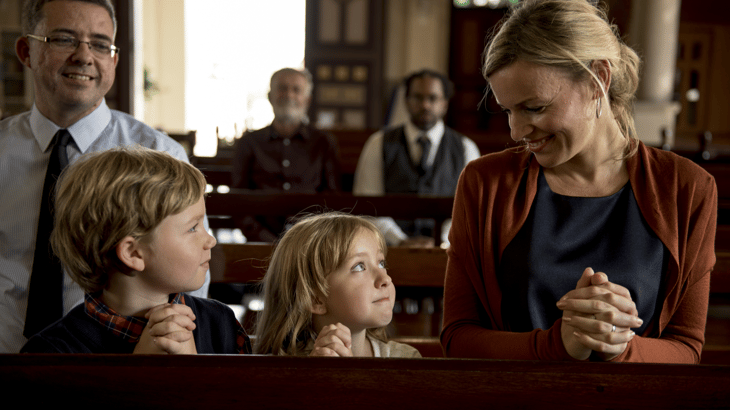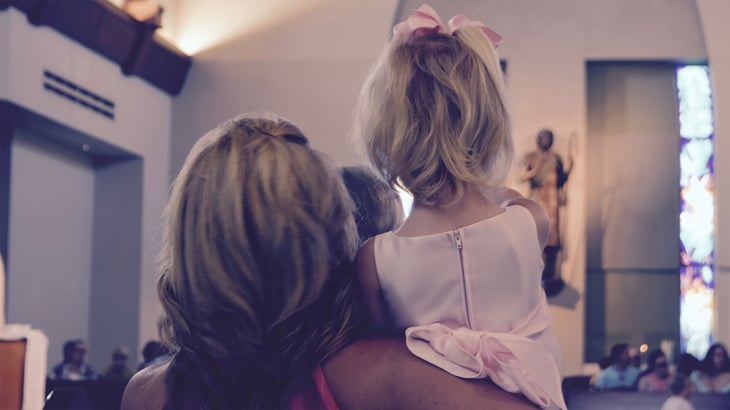Recent Posts by Kyla Rodriguez
Christian Parenting Tips: Preparing Children for Worship
What is your biggest worry or fear when you think about taking your kids to church? Does it make you anxious or even stop you from going to church altogether? Join Kyla as she shares some wisdom to soothe these fears.
Ideas for Raising Faithful Children
Almost every week without fail, it takes about three hours to get my three young children and me to worship—from when I wake up Sunday morning to when I (barely) make it out the door. I spend more time getting ready for our worship service than in the service itself.
How to Place Hope in Jesus for the New Year
“It wasn’t what I was expecting, Mom.”
Those reflective words from my five-year-old come from countless experiences of navigating transitions and life together. The intersection of hope meeting reality is something he wears on his sleeve. He is not the type of person who thrives on or even enjoys surprises. Over the years we have worked to give meaning and language to what he feels when something just does not match up with what he hoped for or imagined it to be in his head and now we have settled on that phrase “it wasn’t what I was expecting.”
The Christian Perspective of Christmas
Is your Christmas shopping done yet? Yes? Congratulations, you win Christmas this year! No? Good luck. Haven’t you heard about all the shipping delays, inventory shortages, and lack of retail workers?
Benefits of Waiting as a Christian
There are forty-one days until Thanksgiving, forty-four days until the start of Advent, seventy-one days until Christmas morning, and seventy-eight days until the beginning of the new year. I’m guessing that if your life is anything like mine, you also have personal countdowns you could add to this list. Perhaps your countdown is for an upcoming birthday, the end of a school semester, the next time you will see your family, a doctor’s appointment or test result coming up, or a special event or trip. There is always a countdown to something. And a countdown is just another way to say that you are waiting for something to happen.
How to Stay Focused on Christ
“I hope we are going to learn about Jesus!” These were the words my three-year-old, and newly minted preschooler, spoke to me as we chatted about what she might do at school the next day. “We didn’t do any activities, but we did learn about Jesus!” was the report from my four-year-old after his first day of school.
Biblical Encouragement for the New School Year
Back-to-school season feels full of possibilities this year. The possibility that school will feel a little more “normal” this year seems within reach, as some schools shift away from the pandemic-related restrictions they used last year. The possibility that school will be just as messy, with a return to quarantining and virtual classes, is also on the table. The possibility that some kids will get sick and some kids will not is also a real threat. School field trips or organized sports and activities may be possible again . . . or not. And in the midst of all of these possibilities, there are the traditional transitions of adjusting to new classmates, teachers, and routines.
Communication Lessons from Paul’s Letters
Do you usually write or speak when you communicate with another person? With rapid advances in technology and widespread use of social media, you probably switch back and forth between those two methods more than you realize. You write an email or text. You send a voice message or video. You write something to post on a social media platform. You comment on a friend’s picture online. You talk to your family. You give a presentation at work. Back and forth, back and forth. We are constantly communicating and doing it in so many ways simultaneously.
Parenting Lessons from Fruit of the Spirit
As a mom to two children under the age of five, I am constantly in the throes of laying groundwork for what I expect and teaching boundaries in a world that doesn’t seem to expect boundaries at all. However, as I have conversations with moms who are in the later stages of parenting, I am starting to understand that conversations about boundaries and expectations aren’t going anywhere anytime soon!
In our house, we are navigating these conversations about boundaries and expectations using the fruit of the Spirit from Galatians 5 to shape our framework. As we work through difficulties with sharing toys or taking turns, the fruit of the Spirit gives us a great framework and simple language to use to help our littles understand how to treat one another. Inevitably, we face many moments when our actions (both on the part of the children or the parents—or both—in our house) not only need an apology but, more important, these moments need forgiveness.
How Creativity Brings You Closer to God
My son, who loves to spend time drawing, has a hard time with his drawings not turning out exactly how he envisioned them in his mind. For a long time, he would only spend time drawing if I was going to draw with him and draw everything the ‘‘right way.’’




















